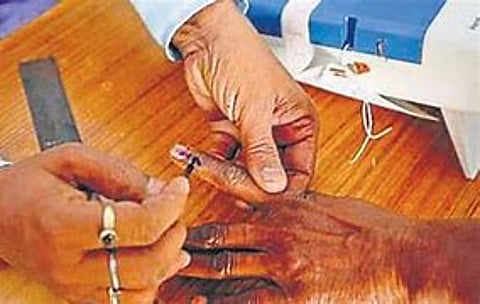
Isabel Wilkerson has described the pain of caste: "Racism is reflected in our skin, while casteism exists in our bones." Caste has become a perpetuator of discrimination against the marginalized sections of Hindu society. But the caste system establishes a social hierarchy based on grading, which has been the backbone of the caste system.
However, some castes have been at the bottom of this social hierarchy not because of their past position and power, but their present profession and political leadership, i.e., Balmikis.
Ajay Prashad argued in his seminal work "Untouchable Freedom: A Social History of a Dalit Community" that Balmikis are the most backward people in the Dalits, who have been indulging in sanitation and cleanliness work for centuries.
The bulk of the Balmiki community today labors as sweepers hired by the municipalities of the cities on minimum wage. For their emancipation, Balmikis moved towards Hinduism in the 1980s, particularly after the emergence of the BJP and Vishwa Hindu Parishad, which promised to erect a temple of Valmiki (the sage of the Balmikis) within the Babri Masjid-Ram Janmabhoomi.
The youth of Balmikis were participating in militant Hindu politics, and they believed that their poverty was the result of Muslims, Jatavs, and Chamars. Prashad argued that poor and illiterate Balmikis had fallen into the RSS trap, while Jatav and Chamars, who were more educated compared to Balmikis, were the backbone of the Bahujan Samaj Party and the Samajwadi Party.
They did not share the Hindutva political vision and had not entered its political machinery. Further, Dalits in Maharashtra, such as the Mahars, didn’t support Hinduism. (Prashad, 2020: XIV)
I wrote on December 24, 2023, in the Mooknayak about the issue of Deprived Scheduled Castes (DSC), as the population of Haryana is expected to reach 27,388,008 in 2022-2023, up from 25,353,081 in the 2011 census, according to Aadhar Statistics.
One-fifth of this population is Scheduled Castes (SC). But all SC upliftment has not been equal, as Nitika Gupta argued in her article, "Manual Scavenging: The Pursuit for Human Dignity," that the Universal Declaration of Human Rights' (UDHR) first article talks about human dignity, but still, manual scavenging is a clear violation of the dignity and human rights of the individuals involved. They are subjected to degrading and inhumane conditions, handling human waste with their bare hands and lacking access to basic sanitation facilities.
This occupation perpetuates social stigma, discrimination, and the marginalization of affected communities, reinforcing caste-based oppression. Therefore, the SC’s quota in Haryana was divided into two groups, Block A and Block B, by Bhajan Lal's Government.
The socioeconomic and educational representations of the caste served as the basis for this division. However, it was again combined into a single SC category in 2006 by the Government of Haryana. The integration of the Reservation quota became the cause of aggression of Balmikis.
Later, the Bhartia Janta Party (BJP) came to power and promised the segregation of SC’s reservation. Subsequently, in 2020, the Haryana Assembly enacted a measure to divide the state's higher education institutions' 20% reservation quota for SCs into two halves, with one portion designated for the new 'DSC' category.
Thirty-six communities are included in the DSC category: Sapera, Valmiki (Balmiki), Bazigar, Sansi, Deha, Dhanak, etc. The government argued that the percentage of DSC’s share is just 4.7%, 4.14%, and 6.27% in Group A, Group B, and Group C services, respectively. The populace of DSC cannot tolerate this representation.
This segregation was welcomed by the DSC, and they conducted different public rallies and yatras with the banner of the DSC, demanding from the government to extend the segregation of quotas to jobs as well. I was also sure that the government would take it seriously and continue to appease this group.
But in the current parliamentary election, which is being held in 7 phases from April 19 to June 1, the Haryana polls will be held in a single phase on May 25, 2024.
In another way, we can say both main alliances are the National Democratic Alliance (NDA)-led Bharatiya Janata Party (BJP), and a coalition of 28 parties called the Indian National Developmental Inclusive Alliance (INDIA), led by the main opposition Indian National Congress, ignored the DSC’s candidacy as a Member of Parliament (MP) on the reserved seats in Haryana, as two seats have been reserved for the SC: Ambala and Sirsa.
Both have declared their candidates from the particular caste (Chamar) from SC: the BJP’s Banto Kataria and Congress’ Varun Chaudhary from Ambala, the BJP’s Dr. Ashok Tanwar and Congress’ Kumari Selija from Sirsa. If we look at the 2019 Lok Sabha elections, Haryana allocated 10 Members of Parliament (MPs) to the Lok Sabha, the lower house of the Indian Parliament.
The BJP emerged as the dominant force in Haryana, clinching a sweeping victory by securing all 10 Lok Sabha seats. BJP's triumph in Haryana significantly bolstered its overarching success in maintaining power at the national level. (May 16, 2024, The Times of India) In 2019’s election, both national parties, i.e., the BJP and Congress' candidates, belonged to one particular caste [Chamar] from SC. As from Ambala, the BJP’s candidate was Mr. Rattan Lal Kataria, while the Congress' candidate was Kumari Selja. The BJP won Ambala’s seat with a margin of 3,42,345 votes, which was a huge margin.
Another of Sirsa's candidates for the BJP was Sunita Duggal, while Congress’ candidate was Dr. Ashok Tanwar. The BJP won the Sirsa by a margin of 3,09,918. (May 1, 2024, The Indian Express) After this discussion, it has been clear that, without a good share in education and bureaucracy, DSCs can’t easily reach Delhi.
-The Author Dr. Krishan Kumar is a scholar based in Haryana specializing in Dalits and Marginalized Studies, with a focus on social inclusive policies. He is currently engaged in research related to caste issues
You can also join our WhatsApp group to get premium and selected news of The Mooknayak on WhatsApp. Click here to join the WhatsApp group.